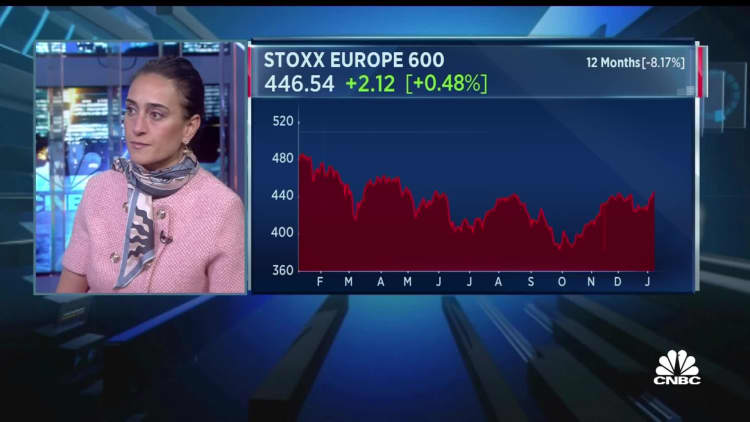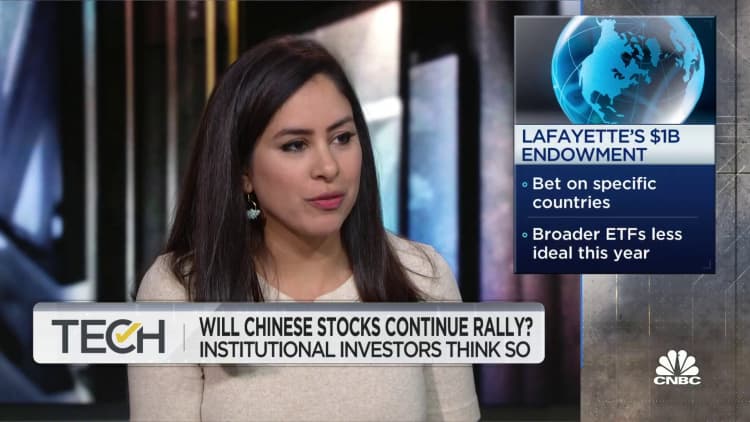
Last year took the U.S. economy and markets on a bumpy ride — and the year ahead also looks tough. It’s led some strategists to argue 2023 could be Europe’s time to shine.
Zeynep Ozturk-Unlu, Deutsche Bank’s chief investment officer for EMEA, sees a case for Europe outperforming both economically and in capital markets, with contraction and recession fears becoming “more accelerated” in the U.S. than in Europe.
This is despite Europe facing its own challenges, Ozturk-Unlu said, including the ongoing war in Ukraine, the energy crisis and inflation that has not yet peaked — and is unlikely to hit the European Central Bank’s 2% target until mid-2024 at the earliest.
“Europe has been in expansionary fiscal policy mode for quite a while, especially due to the energy crisis,” she told CNBC’s “Squawk Box Europe” Monday. “But beyond that … Europe is also betting on the reopening of China and it is going to give positive tailwinds to the European growth story.”
European GDP growth last outpaced the U.S. in 2017, though final 2022 figures have not yet been released.
Ozturk-Unlu pointed to the diversification of sectors in Europe compared to the U.S. and sustainable production growth, particularly in Germany and France, as a case for the region having more stable economic growth.
When it comes to stocks, she continued: “It doesn’t mean Europe is completely immune and is in great shape, but in relative terms the shift from growth [stocks] to value actually gives a little bit more opportunity to Europe compared to U.S.”
So-called growth stocks — which include the big U.S. tech stocks — were hit hard in 2022, as the U.S. Federal Reserve raised interest rates which hit future earnings expectations. Value stocks, in comparison, tend to outperform as rates ride, and Europe broadly possesses a higher proportion of value stocks than its global peers.
In the year to date, Europe’s Stoxx 600 index has risen over 5% versus a 3.4% gain in the U.S. S&P 500.
Despite clocking their worst performance since 2018, European shares also outperformed the U.S. last year, ending with a 13% loss compared to 19.4% for the S&P.
“There’s this opportunity coming from the significant undervaluation of Europe compared to the U.S.” Ozturk-Unlu added. “That’s why we think that the world outside of the U.S. will outperform the U.S., and Europe in relative terms, in equities, will outperform.”
Brighter outlook, but risks remain
Deutsche Bank is not alone in its more optimistic outlook for Europe.
Further tightening by the Fed, euro zone fiscal stimulus, China’s reopening providing a boost for Europe in particular, and falling energy prices were all cited by strategists as reasons why Europe’s economy could outperform in 2023.
And some early data points do look positive for the euro zone compared to the U.S.

Composite purchasing managers’ index figures — a closely watched measure of economic trends — fell to a 4-month low of 45 for the U.S. in December. In contrast, the euro zone figures rose to a 5-month high of 49.3, a hair’s breadth away from the expansion territory figure of 50.
Karsten Junius, chief economist at Swiss bank J. Safra Sarasin, expects flat GDP growth in the euro zone this year, versus a 0.5% contraction in the U.S.
However, he does not expect this to translate into outperformance in equity markets. One reason for this is the recent appreciation of the euro, which tends to weigh on earnings with a three-month delay, he told CNBC via email.
A number of strategists argued that while markets were driven by monetary policy in 2022, they will be more guided by economic data and earnings in 2023.

They include Joost van Leenders, senior investment strategist at Van Lanschot Kempen. Unlike Junius, he was more cautious on Europe’s economic outperformance, but said stocks could surprise to the upside.
“If there is a recession in Europe and the U.S., there needs to be downgrades in terms of weaker earnings across the board — the U.S. looks more progressed in that sense,” he told CNBC via phone.
“But if the recession in Europe turns out to be very shallow, then because the discount of Europe to U.S. is almost as wide as it has ever been, it could be a trigger to unlock that valuation discount,” he added, as long as the Fed doesn’t start cutting rates thereby boosting U.S.-based growth stocks.
Paul O’Connor, head of the multi-asset team at asset management firm Janus Henderson Investors, agreed that there were “good reasons” to believe an era of U.S. stock market outperformance had begun a reversal that could extend through 2023 and beyond.
“While post-Global Financial Crisis U.S. equity outperformance was underpinned by superior U.S. earnings momentum, this influence was amplified by a relative valuation shift in favor of U.S. stocks. Both trends are now reversing. While U.S. stocks look expensive relative to bonds and their own history, stocks in most other markets look fairly valued,” he told CNBC.















